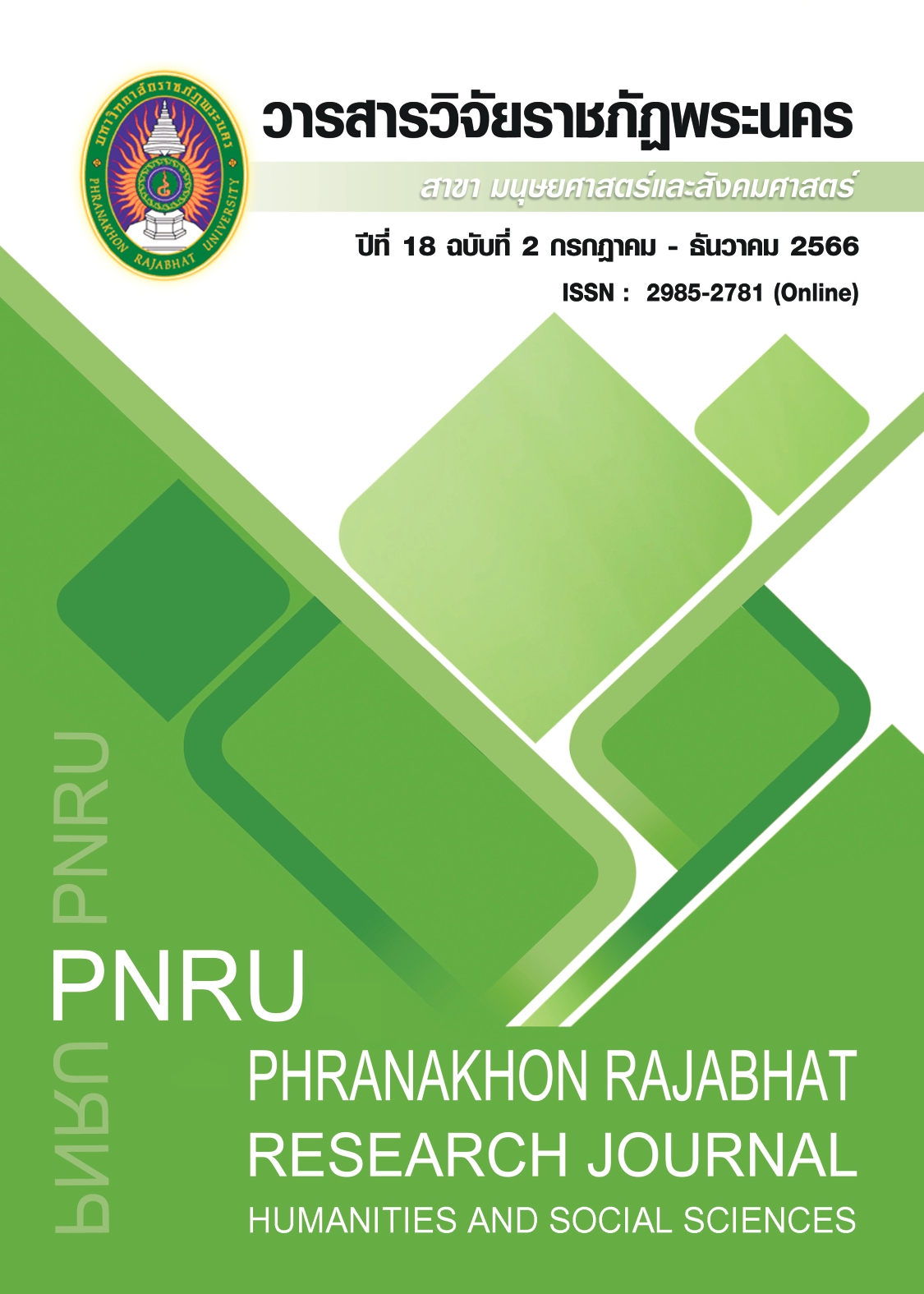PROMOTING ENGLISH LANGUAGE AND CRITICAL THINKING SKILLS THROUGH THE ENGLISH-FOR-THAI TAXI DRIVERS PROJECT
Main Article Content
บทคัดย่อ
English language ability and critical thinking skills are two competencies considered necessary for the 21st century and Thailand’s national development. However, Thai education in general has not been successful in developing these two competencies in Thai students. Hence, various efforts and interventions have been made to address these challenges. This study reflects an effort to address the two challenging competencies. It aims to promote Thai university students’ English language learning and critical thinking skills through project-based instruction. In this classroom research, a total of 31 students participated in the English-for-Taxi Drivers Project as part of an elective course on cross-cultural communication at an urban university in Bangkok. The project entailed data collection and service learning. This semester-long project started in September and lasted until November 2017. After the project, the students were asked to reflect on their learning experience by answering the questionnaires. Results showed that the majority of the students had positive attitudes towards the project, agreeing that the project has developed their cognitive as well as soft skills. In addition to English language skills, several dimensions of the projects, such as task complexity and demand for cooperation and human relation, have helped promote the students’ critical thinking skills.
Article Details

อนุญาตภายใต้เงื่อนไข Creative Commons Attribution-NonCommercial-NoDerivatives 4.0 International License.
บทความที่ได้รับการตีพิมพ์เป็นลิขสิทธิ์ของมหาวิทยาลัยราชภัฏพระนคร
ข้อความที่ปรากฏในบทความแต่ละเรื่องในวารสารวิจัยราชภัฏพระนครเล่มนี้เป็นความคิดเห็นส่วนตัวของผู้เขียนแต่ละท่านไม่เกี่ยวข้องกับมหาวิทยาลัยราชภัฏพระนคร และคณาจารย์ท่านอื่นๆในมหาวิทยาลัยฯ แต่อย่างใด ความรับผิดชอบองค์ประกอบทั้งหมดของบทความแต่ละเรื่องเป็นของผู้เขียนแต่ละท่าน หากมีความผิดพลาดใดๆ ผู้เขียนแต่ละท่านจะรับผิดชอบบทความของตนเองแต่ผู้เดียว
เอกสารอ้างอิง
Bassi, S. (2011). Undergraduate nursing students’ perceptions of service-learning through a school-based community project. Nursing Education Perspectives, 32, 162-167. Retrieved from https://doi.org/10.5480/1536-5026-32.3.162
Bilsborough, K. (n.d.). TBL and PBL: Two learner-centered approaches. British Council. Retrieved from https://www.teachingenglish.org.uk/professional-development/teachers/knowing-subject/articles/tbl-and-pbl-two-learner-centred [2024, 14 Dec.]
Bloom, B.S. (Ed.). Engelhart, M.D., Furst, E.J., Hill, W.H., Krathwohl, D.R. (1956). Taxonomy of educational objectives, handbook I: The cognitive domain. New York: David McKay Co Inc.
Bytyqi, B. (2021). Project-based learning: A teaching approach where learning comes alive. Journal of Teaching English for Specific and Academic Purposes, 9(2), 287-296. https://doi.org/10.22190/JTESAP2102287B
Cates, K. A. and Jacobs, M.G (2006). Global issues projects. in G. H. Beckett & P. Chamness Miller (Eds.), project-based second and foreign language education: Past, present, and future (pp. 169-179). Greenwich, CT: Information Age.
Chomsky, N. (1975). Reflections on Language. New York: Pantheon Books.
Chong Min Cheong, Wing Sum Cheung (2008). Online discussion and critical thinking skills: a case study in a Singapore secondary school. In Australasian Journal of Educational Technology, 24(5), pp. 556-574. Available online at https://ajet.org.au/index.php/AJET/article/view/1191
Davies, M., & Barnett, R. (2015). Introduction. In M. Davies & R, Barnett, (Eds.), The Palgrave handbook of critical thinking in higher education. (pp.1-26). New York: Palgrave Macmillan.
D’Argenio, L. (2022). Skills in the ESL classroom. Retrieved from https://bridge.edu/tefl/blog/teaching-critical-thinking-skills-esl-classroom/
English First. (2018). EF English proficiency index: Thailand. Available online at https://www.ef.co.th/epi/regions/asia/thailand/
EF Education First. (2022). EF English proficiency index 2022 – Thailand. Retrieved from https://www.ef.com/wwen/epi/regions/asia/thailand/
Ennis, R. (2011) The Nature of Critical Thinking: An Outline of Critical Thinking Dispositions and Abilities. Retrieved from https://education.illinois.edu/docs/default-source/faculty-documents/robert-ennis/thenatureofcriticalthinking_51711_000.pdf?sfvrsn=7bb51288_2
Hanada, K. (2018). Conventional system in need for revamp in digital age. Bangkok Post.
Lai, E. R. and M. Viering. (2012). Assessing 21st century skills: Integrating research findings. Vancouver, BC: National Council on Measurement in Education.
Leat, D. (2017). Why we need enquiry and project based learning. In D. Leat (Ed.), enquiry and project based learning: Students, school and society (pp. 1-27). London: Routledge.
Lipman, M. (2003). Thinking in education (2nd ed.). Cambridge University Press.
Malone, M. R. (2020, October 8). Cultivating empathy: Selfless acts are good for others and good for you. https://news.miami.edu/stories/2020/10/cultivating-empathy-selfless-acts-are-good-for-others-and-good-for-you.html
P21.Org (2017). Framework for 21st Century Learning. Retrieved from http://www.p21.org/our-work/p21-framework
Schuetz, R. (2018). Project-Based Learning: Benefits, Examples, and Resources. Retrieved from https://www.schoology.com/blog/project-based-learning-pbl-benefits-examples-and-resources
Sinlarat, P. (2017). Thailand Education 4.0: An educational philosophy for creative and productive citizens. Bangkok: Chulalongkorn University Press.
Stanford Encyclopedia of Philosophy (2017). Informal Logic. Retrieved from https://plato.stanford.edu/entries/logic-informal/
Thadphoothon, J. (2005). Promoting critical thinking in language learning through computer-mediated collaborative learning : a preliminary investigation. (Unpublished doctoral dissertation). University of Canberra, Australia.
Vanberen, J. (2017). Critical thinking skills in a team. Retrieved from https://bizfluent.com/info-7908678-critical-thinking-skills-team.html
Wongudomsin, S. (2018). An application of debate and discussion class to develop moral reasoning of third-year students at Sakon Nakhon Rajabhat University. Proceedings of 3rd International Conference on Language, Literature, and Cultural Studies, July 19-20, 2018, pp. 197-203. Retrieved from https://docs.wixstatic.com/ugd/b8b1d4_d5501017e5b84d6b81188c69116ed483.pdf


